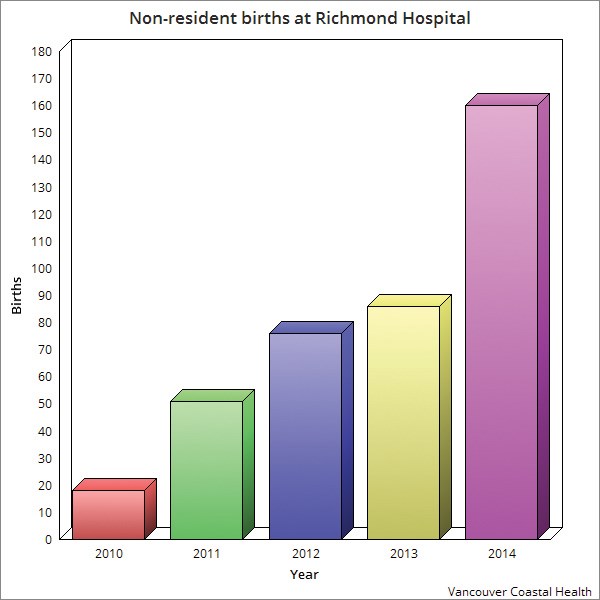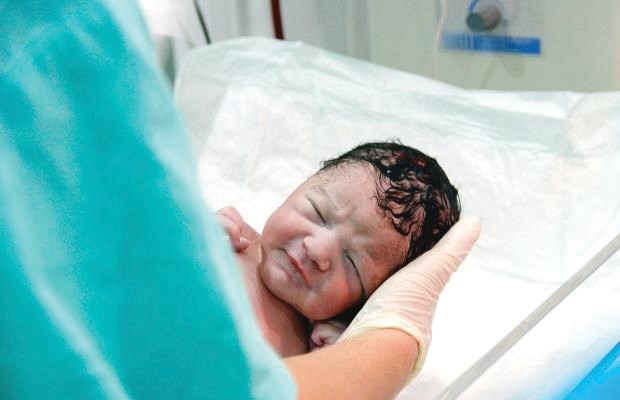2014 was a record-smashing year for births by non-residents at Richmond Hospital, which may very well be ground zero for birth tourism in the country.
Over an eight-month period last year, just over one in ten babies delivered at the hospital were from non-resident mothers.
From January to September 2014, 160 non-residents gave birth at the hospital, with data for the year-end yet to be tabulated.
The hospital has set new benchmarks every year since 2010. From 2004 to 2010 the hospital helped birth, on average, 18 new Canadians per year from non-resident mothers.
The rise in non-resident births coincides with an approximate doubling of total births in the same time period — in 2004 the hospital birthed 936 children while in 2013 it birthed 1921. In 2004, non-residents accounted for 1.5 per cent of births; in 2014, they accounted for 10.7 per cent (of 1484 total births up to September).

This baby boom has drawn criticism from many hospital employees, according to one worker, who spoke to the Richmond News on behalf of others and on the condition of anonymity.
“The (hospital workers) said that, though they treat these patients with the same compassion and care that they treat everyone with, it is frustrating for them because they know that B.C. residents, contributing to (the Medical Services Plan), are being deprived of beds because of the hospital’s/obstetrician’s insistence that these ‘self-pay’ clients be accommodated. During (one) shift that I was there, there were four self-pay clients in maternity beds (and the ward only has 15 beds),” said the worker.
When the News asked Diane Bissenden, director of population and family health for Vancouver Coastal Heath, if the hospital is encouraging non-resident births for monetary purposes, she replied that the hospital does not deny patients based on resident status.
The hospital asks non-residents to pay a $7,500 deposit for a regular birth and $15,000 for a C-section birth.
VCH does not have readily available data for how much Richmond’s birth centre has made, but Bissenden notes: “If non-resident clients use the services at one of our hospitals, VCH has systems in place to collect compensation. We operate on a full cost-recovery basis and find the rate of remuneration from non-resident patients to be quite high.”
Many in-patient services are two to three times the rate the hospital charges the government for insured expectant mothers.
For instance, a newborn per diem after discharge is $3,400, whereas the hospital only fetches $1,100 for an insured patient. Maternity assessments cost non-residents $720, whereas MSP is billed just $288.
Bissenden said the money goes to VCH, which may be a bone of contention with workers in the maternity ward.
“So despite the profits the hospital makes, the maternity ward bears the workload, unsupported and uncompensated,” said the worker.
Another issue raised is the fact the non-resident maternity patients spend one less day in the hospital, according to data (2.2 days for residents compared to 1.2 days for non-residents, throughout VCH in 2013).
“Patients would not be discharged if there were any risks to the mother’s health or that of their baby. All patients are discharged when they meet discharge criteria.
The goal is to ensure that women are able to manage self-care for themselves and their newborns, including breastfeeding,” said Bissenden.
Hospital patients can be discharged against medical advice but the hospital does not track that data specifically pertaining to births.
Bissenden said when it comes to deciding which mother to move to another hospital in the case of limited beds, residents and non-residents are treated equally.
“In some cases, when demand exceeds our capacity, mothers may be diverted to another birth centre in the Lower Mainland – this is not a new process to any of the birth centres,” she said.
Birth tourism happens for a myriad of reasons, such as preferred health service, circumventing national birth limitations (such as in China), and gaining citizenship for the child without having to live in Canada.
Immigration critics and the Conservative federal government have expressed concerns over the latter.
In 2013, now former immigration minister Jason Kenney, proposed to change “birth on soil” provisions in the Citizenship Act by not granting citizenship to newborns of non-residents except in cases when the baby would become stateless.
A report tabled by Kenney noted that Statistics Canada only reports about 500 out of 360,000 births in Canada annually are by non-residents. However, he argues that number is likely higher since the data is based on self-declaration.



